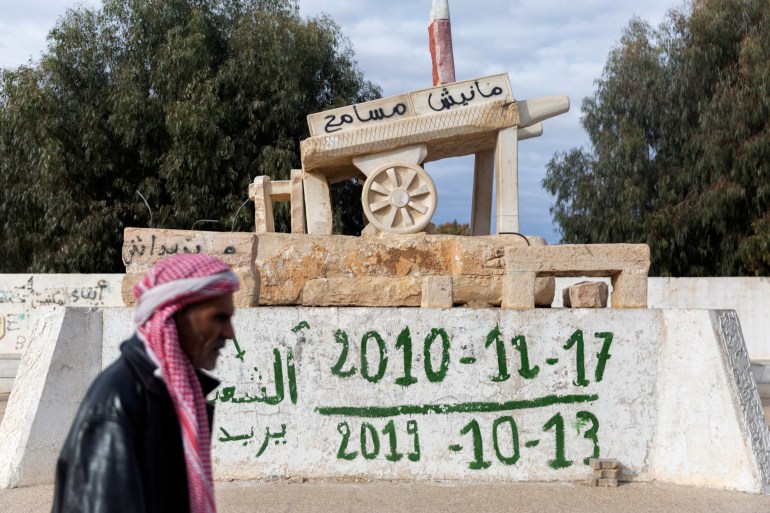‘Tired of waiting’: Tunisians mark decade since Arab Spring
Economic hardships and widespread corruption grip Tunisia 10 years after an uprising that spread across the Arab world.

Ten years since the early days of Tunisia’s revolution, hopes for a better future lie crushed as major economic hardships persist amid a pandemic that has exacerbated the situation.
And in the rural town where it began, few are celebrating.
Keep reading
list of 3 itemsHow economic hardship fuelled the Arab Spring 10 years ago
Remembering Mohamed Bouazizi: The man who sparked the Arab Spring
It was in Sidi Bouzid that Mohamed Bouazizi, a fruit and vegetable seller, angered by police harassment, set himself alight on December 17, 2010.
His act sparked an unprecedented uprising that left some 300 dead but also toppled longtime autocrat Zine El Abidine Ben Ali, who went into exile on January 14, 2011.
His departure triggered a string of uprisings that followed around the Arab world.
While Tunisia has been praised for its democratic transition, with freedom of speech and transparent elections, the hope of those early years has dissipated amid widespread corruption and repeated economic crises, the latest of which came amid the raging coronavirus pandemic.
To date, Tunisia has reported more than 114,000 COVID-19 infections, and nearly 4,000 deaths.
So there was little sense of celebration, even as Tunisian flags lined the streets of Sidi Bouzid this week.
Rather than festivities, December 17 has become a date for protests against the post-Ben Ali government, which has yet to deliver on two key promises of the revolution: Jobs and dignity.
In Sidi Bouzid, large posters on the walls read: “We prepared the way for freedom, but you drifted away from it,” and “Slogans must be turned into action.”
“Neither the government nor the governed are in a mood for celebrating, because the general feeling is that the country is doing badly,” said analyst Hamza Meddeb.
‘Sense of failure’
Meddeb noted that Tunisians had won political freedoms but: “Ten years on from the revolution, there’s a real sense of failure”.
The political class, more fragmented than ever since parliamentary elections last year, is paralysed by bitter infighting that has prevented it from tackling urgent social and economic problems.
Tunisia suffers a national unemployment rate that exceeds 15 percent, disproportionately hitting young people in the long-marginalised interior.
Salaries have been devalued by inflation, while political instability has crushed hopes for fundamental reforms.
Tunisians have been one of the largest contingents of foreign armed fighters in Syria’s civil war, while the economic situation has pushed many others to make death-defying bids to reach Europe.
In Sidi Bouzid, a stage has been erected for a concert with local rap stars; the theme is: “Ten years, the wait has been long”.
“This event shows the importance we place on the revolution, but it doesn’t hide our anger and amazement at the current political class” and its behaviour, said Youssef Jilali, a spokesman for the organisers.
No official visits to Sidi Bouzid have been announced – even by President Kais Saied, elected in October 2019 under the slogan “the people want”, a reference to the revolution.
His office said on Wednesday evening he would not be there to mark the anniversary, due to “urgent commitments”.
Meddeb said Tunisians were “really angry” and it was “not a good moment for political officials to make visits”.
Last week, Prime Minister Hichem Mechichi was met with cries of “Resign,” when he visited the northwestern city of Jendouba to pay his respects to a young doctor who died in an accident in a hospital lift-shaft.
The tragedy, which prompted thousands of medics to protest in Tunis, was widely blamed on official corruption and indifference.
Strikes, road blockages and protests have mushroomed in recent weeks as people demand jobs, more investment, better work conditions, and improvements to crumbling public services.
“We’ve stopped expecting anything from the political class,” said Sidi Bouzid resident Jamel Bouzidi. “We’re tired of waiting.”
A decade since the uprising, “people don’t have the patience any more to listen to speeches or announcements or declarations,” Meddeb added. “They want concrete actions, now.”
‘Very disappointed’
Meanwhile, Leila Bouazizi, Mohamed Bouazizi’s sister, admits that the revolt has done little to solve the economic problems that pushed her brother over the edge, but says Tunisians should keep up the fight for their rights.

“Everyone thought the government would do something,” she told AFP news agency in Quebec, Canada, where she moved to study in 2013 and has lived ever since.
“Unfortunately, it did nothing,” she added, saying she was “very disappointed” in the outcome of the uprising.
